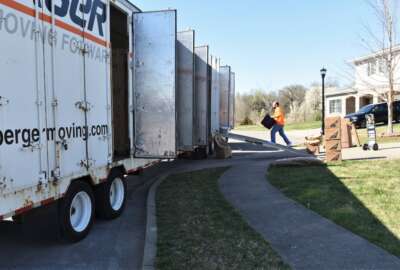UPDATED
DoD ready to start implementing multibillion dollar moving contract after solving latest tech hurdle
The $17.9 billion moving contract's latest delays had been caused by IT integration challenges, but those problems have apparently been solved.
This story was updated on Feb. 20, 2024 at 5:30 p.m. EST to include comments from U.S. Transportation Command.
The Pentagon’s massive project to overhaul the military’s system for moving members’ belongings from one duty station to another has cleared its latest technical hurdle and is finally ready to begin implementation, government and company officials involved with the multibillion dollar Global Household Goods contract said Tuesday.
A new round of IT integration testing, conducted in January, proved “successful,” Stuart Bradie, the president and CEO of KBR, told investors on a conference call. HomeSafe, the holder of the up to $17.9 billion Global Household Goods Contract (GHC), is a joint venture between KBR and Tier One Relocation.
Problems with integrating U.S. Transportation Command’s systems with the vendors’ technology, called HomeSafe Connect, were the latest hurdle in implementing the moving contract, which Defense officials previously planned to being using for military moves last September. Now that those issues have been ironed out, HomeSafe and DoD intend to start conducting “test moves” involving short-distance shipments this spring, Bradie said.
“The volume ramp will be in a controlled manner through the year with the expectation of significantly ramping up into 2025, especially the busy season and international moves will then follow as we head into 2026,” he said. “So in short, a delay of one year. Though a delay is always frustrating, I believe it has allowed both sides that time to direct the startup and of course the ramp, which ultimately is a good thing.”
On a conference call with reporters later Tuesday, U.S. Transportation Command officials said they intended to begin the test moves as soon as possible. Within the next few weeks, after some final consultations with the military departments, officials plan to publicly announce the first locations where the new moving contract will be implemented for the first time.
The first awards to HomeSafe for actual — albeit short-distance military moves — should be made within the “next couple of weeks,” said Andy Dawson, the director of TRANSCOM’s Defense Property Management Office.
“And then the next steps after local moves will be interstate moves between installations, and then we’ll look to expand locations,” he said. “And there’s several ways that we can increase the volume. Whether it’s increasing the zip codes around an installation, or increasing those interstate shipments. Our first focus is on the domestic, and that is our initial priority.”
During the upcoming 2024 peak summer season, DoD only expects about 1% of its overall household goods volume to use the new moving contract. From there, it intends to start ramping up its use of GHC within the continental United States starting in September. International moves under the new contract aren’t likely to begin until September 2025 at the earliest.
“We’re finalizing [the timeline] right now, but I think what’s different this year is the ability to do these test shipments and actually see the systems in use,” Dawson said. “We can get feedback and make whatever adjustments are necessary, and that will help us drive the timeline this fall. That’s really the game changer for this summer: these test shipments and the ability to actually see the tools in use.”
Supplier base will be adequate, company says
KBR’s Bradie also sought to reassure investors that HomeSafe will have enough participation from the moving industry to successfully implement the contract. The company does not operate any trucks or employ any movers on its own; it will rely entirely on subcontractors to conduct the work.
Federal News Network reported in January that few, if any of DoD’s current moving providers are willing to take part in the GHC contract, partly because the rates HomeSafe is offering are significantly lower than what DoD is currently paying the companies under its existing moving system, known as DP3. Several traditional movers said they would lose money if they agreed to take shipments under the new rate structure.
But Bradie dismissed those concerns as “media noise.”
“The intent of this program is to redefine the moving experience of our military personnel and their families, and to deploy an IT backbone with intelligence to retain data and knowledge that allows for optimization and importantly, accountability. To achieve this, we require a certain level of disruption and of course, disruption leads to change,” he said. “The objective is to disrupt the industry so it becomes far more competitive and a lot of the middle layers are taken out. We get to focus on the actual truckers and their families, and we help them grow their businesses because they’re performing and they’re accountable. So I expect more noise in that sense. Am I concerned about the rate structure? No, I’m not. I think we will work through that with TRANSCOM.”
Bradie said HomeSafe now has 380 “fully executed” agreements in place with moving subcontractors, and that “several” large van lines have told the company they are willing to commit to working under the new moving contract once the program reaches higher volumes of moves.
Reached by email, a spokesperson for HomeSafe said the 380 companies who have signed on and passed its vetting criteria are a mix of existing military movers and firms with experience only in non-military moves. However, HomeSafe is declining to identify any of those subcontractors.
“Vocal opposition seeking to hinder the GHC roll-out leaves some of our subcontractors reticent to publicly disclose their partnerships with us,” the company said in a statement. “Much of the opposition to the GHC is a push to preserve the status quo, and it neglects to consider why we need the GHC in the first place: to correct longstanding issues with the military move process which have caused military families unnecessary harm and stress. The military community and Congress demanded reform, and HomeSafe is answering that demand.”
Subcontractor capacity remains unclear
Industry experts said it is difficult to know how much moving capacity will be available under the GHC contract without knowing which firms have signed up. They also cautioned that signing HomeSafe’s master services agreement does not guarantee that a given firm will actually conduct moves under the new moving contract.
“We don’t have independent numbers on [signed contracts], but it would seem to me that a signed agreement doesn’t necessarily mean a service provider is compelled to move any shipments just because they signed the agreement,” said Daniel Bradley, the vice president for government and military relations at the International Association of Movers. “Certainly, some of our members have said they signed the agreement as a way to learn more about compensation structure, because there have been times when potential service providers couldn’t get access to view rates without having signed an agreement.”
In a January interview, Matt Dolan, HomeSafe’s president, acknowledged the company faces an uphill battle in persuading moving companies to sign on.
“I’ve got a lot of work to do to convince them,” he told Federal News Network. “I don’t think the whole story has been told, but I think the one thing that’s definite is that this is going forward. TRANSCOM is committed, and we’re committed. Compensation will always be an issue, but TRANSCOM has been a great partner and there are methods to take that into account. I have great friends in industry who give me their straight feelings on it, and I don’t deny any of it. But we think we’ll be successful.”
Copyright © 2024 Federal News Network. All rights reserved. This website is not intended for users located within the European Economic Area.
Jared Serbu is deputy editor of Federal News Network and reports on the Defense Department’s contracting, legislative, workforce and IT issues.
Follow @jserbuWFED





